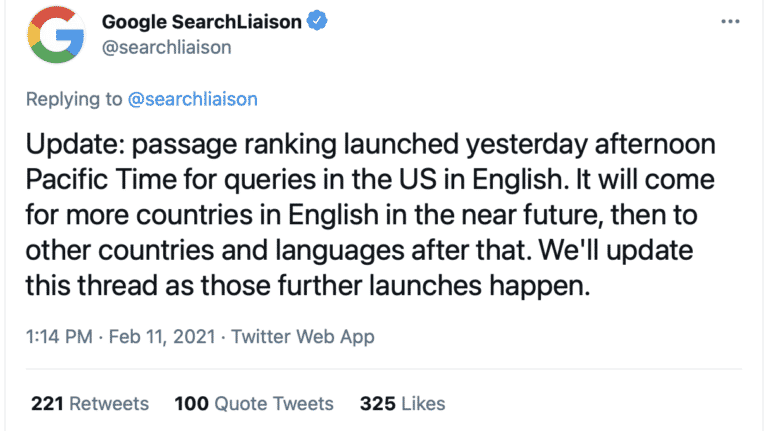Sometimes you use Google to search for general information about a topic. National parks. Stevie Wonder. Australian cattle dogs. Other times, you turn to Google for very specific information. Why does asparagus make your pee smell? When you’re seeking specific information, you don’t want to dig through a web page to find that nugget of knowledge. You want an answer fast, without any hassle or fuss. To improve the search experience for those with very specific queries, Google has introduced a feature called passage ranking. Announced in October 2020 under the name “passage indexing,” this is a new method that Google is using to rank specific passages from web pages on search results pages. Not only has the method changed names since its introduction – it is now known as “passage ranking” – but also it went live! As of February 10, 2021, passage ranking is live for all English queries in the United States. Let’s learn a little more about it.

Google Passage Ranking 101
What Is Google Passage Ranking?
When Google introduced passage ranking, they described it in this way: “Very specific searches can be the hardest to get right since sometimes the single sentence that answers your question might be buried deep in a web page. We’ve recently made a breakthrough in ranking and are now able to better understand the relevancy of specific passages. By understanding passages in addition to the relevancy of the overall page, we can find that needle-in-a-haystack information you’re looking for.”
So in the past, if you searched for something specific, Google might have provided several results that seemed relevant overall, even if they didn’t directly answer the query. Now, using passage ranking, Google may present a web page with a passage that does directly answer the query, even if the rest of the page isn’t very relevant. The search engine’s system is able to understand that the searcher will find that relevant passage more valuable than another page that centers around the topic more broadly. It will zero in on that helpful passage and rank the page more highly.
So . . . Google Is Indexing Passages of Pages?
No. This is why Google changed the name from “passage indexing” to “passage ranking.” The term “indexing” doesn’t accurately reflect what’s happening.
Indexing has not changed. Google will continue to index full pages, not short passages of pages. However, the algorithm will consider the content and meaning of passages when determining which web pages are most relevant, and it will be able to highlight highly relevant passages on results pages. Previously, the algorithm mostly looked at each page as a whole.
To reiterate, this is a ranking change, not an indexing change. It will impact how Google ranks content. The search engine will be able to identify individual sections of a page that match a query particularly well, even if the rest of that page is about something slightly different or is simply less relevant overall. As always, the aim is to make the search process easier and more fruitful for users.
How Is This Different from Featured Snippets?
Before we compare, let’s review what featured snippets are. According to Google, “Search results sometimes show listings where the snippet describing a page comes before a link to a page, not after as with our standard format. Results displayed in this way are called ‘featured snippets.'” The snippets are drawn from web search listings, and they’re considered especially helpful for those searching on a mobile device. Because they appear at the top of search results pages, they take up valuable real estate in the world of SEO.
Featured snippets are certainly similar to passage ranking, as both tools highlight important passages within a web page. However, with passage ranking, Google’s system determines the relevance of the web page using its understanding of those important passages. Featured snippets, on the other hand, identify important passages within web pages that Google has already determined are relevant to the query.
How Significant Will Passage Ranking Be?
According to Google, “This technology will improve 7 percent of search queries across all languages as we roll it out globally.”
And It’s Already Live?
Yes. Google announced that passage ranking was launched on February 11, 2021, on Twitter:

Have you noticed any changes to your rankings? If your numbers bounced around the week of February 10, the shift may have been due to passage ranking going live. Going forward, you may want to implement some small changes to improve your chances of ranking highly through passage ranking:
- Don’t skimp on content. Pages with more content have a better shot at ranking for more keywords through passage ranking. The content must be high-quality and relevant too, of course.
- Audit your on-page SEO. If you sometimes cut corners or forget on-page SEO strategies, you may want to be more diligent. Optimizing your headings and anchor text could be valuable.
- Use long-tail keywords. When appropriate, use long-tail keywords to help trigger passage ranking. Research these keywords carefully and weave them into your long-form content.
That said, this isn’t a huge update. It’s simply a tweak to the algorithm that will impact less than 10 percent of all queries. So don’t freak out, plan huge changes to your content, or rethink your entire SEO strategy.
Good luck!
If you’re hoping to build a beautiful, effective website that ranks highly on Google, contact 417 Marketing for help. Our team of knowledgeable, creative, and passionate professionals specializes in SEO, web design and maintenance, and Google Ads, and we have successfully completed over 700 websites since our inception in 2010. Click here to contact us and learn more about what we can do for your company.


